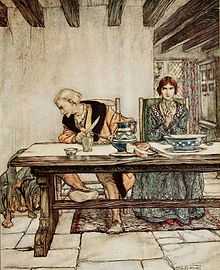Lord Randall
| "Lord Randall" | |
|---|---|
 "Lord Randal", by Arthur Rackham, from Some British ballads (published in about 1919). | |
| Song | |
| Published | 17th century (earliest known) |
| Form | Border ballad and folksong |
| Writer | Traditional |
| Language | English |
"Lord Randall", or "Lord Randal", (Roud 10, Child 12) is an Anglo-Scottish border ballad[1] consisting of dialogue between a young Lord and his mother.[2] Through the mother's inquiry, it is gradually revealed that the Lord has been poisoned by his lover.[3] Similar ballads can be found across Europe in many languages, including Danish, German, Magyar, Swedish, and Wendish.[4] Italian variants are usually titled "L'avvelenato" ("The Poisoned Man") or "Il testamento dell'avvelenato" ("The Poisoned Man's Will"), the earliest known version being a 1629 setting by Camillo il Bianchino, in Verona.[5]
Cultural uses
The English fiction writer Dorothy L. Sayers used a phrase from some variants for the title Strong Poison, a murder mystery about a man apparently murdered by his lover. In 1962, Bob Dylan modeled his song "A Hard Rain's A-Gonna Fall" on "Lord Randall," introducing each verse with variants of the introductory lines to each verse of "Lord Randall." Dylan's ballad is often interpreted as a reaction to the Cuban Missile Crisis. Dylan himself disclaimed this as an oversimplification; actually, Dylan first publically performed the song a month before the crisis.[6][7]
The song "Pictures in a Mirror" from the album "I Looked Up" by the Incredible String Band, mentions Lord Randall.
The nursery rhyme "Billy Boy" borrows the verse structure and the narrative format about a suitor visiting his lover, with a happier ending.
The poem is repeatedly alluded to in the novel The Catcher in the Rye by J. D. Salinger.
In the novel Sweet Thursday by John Steinbeck, the character Mack quotes the recurring phrase of the poem while lying defeated in his bed.
A Boy Scout campfire version of this song is "Green and Yellow".[8] A mother is interrogating her son who "[has] got to be sick" and who requests that she "lay [him] down to die". He tells her that he has been in the woods "eating eels" that are revealed to have actually been poisonous snakes, which kill him.
Covers
- Caedmon Records issued a composite track of traditional singers performing a few verses each on "The Folksongs of Britain IV: Child Ballads I". The singers were Jeannie Robertson, Elizabeth Cronin, Thomas Moran, Colm McDonagh, Eirlys & Edis Thomas.
- The Voice of the People Vol 3 includes a full version entitled "Lord Donald" by the traditional singer John Macdonald.
- Cecil Sharp's arrangement of "Lord Rendal" was recorded by the Russian tenor Vladimir Rosing in the mid-1920s on Vocalion (A0167).
- The folk singer Buffy Sainte-Marie included it on her 1967 album 'Fire & Fleet & Candlelight'.
- A cover by New York jig-punk band The Prodigals on their 2001 album Dreaming in Hell's Kitchen.[9]
- There is also cover by Russian folk rock band Melnitsa on their 1996 album "lunar day"
- Scottish folk-singer Emily Smith includes a version entitled "Lord Donald" in her album "Traiveller's Joy" (2011)
- Einstürzende Neubauten include a German variation, Ein Stuhl In Der Hölle (A Chair In Hell), on their album "Haus der Lüge" (1989)
- A cover by English folk band Steeleye Span on their 1998 album Horkstow Grange.
- A cover by Abner Jay on the 2010 album Folk Song Stylist released on Mississippi Records.
- A cover by Martin Carthy on the 1972 Shearwater album.
- The song "Pictures in a Mirror" on the The Incredible String Band's album I Looked Up mentions Lord Randall.
- A cover by Harry Belafonte on the 1954 album "Mark Twain"
References
- ↑ Border Ballads By William Beattie, Compiled by William Beattie, Published by Penguin Books, 1952, Page 17
- ↑ Francis James Child, English and Scottish Popular Ballads, "Lord Randal"
- ↑ Francis James Child, The English and Scottish Popular Ballads, v 1, p 153, Dover Publications, New York 1965
- ↑ Francis James Child, The English and Scottish Popular Ballads, v 1, p 153-5, Dover Publications, New York 1965
- ↑ Alessandro D'Ancona, La poesia popolare italiana Livorno, 1878, Cf. "L'avvelenato"
- ↑ Mike Marqusee,Wicked messenger: Bob Dylan and the 1960s. Seven Stories Press, 2005, p.64f
- ↑ Robert Shelton,No direction home: the life and music of Bob Dylan. Da Capo Press, 2003, p.152
- ↑ "Green And Yellow - We Know Campfire Songs". weknowcampfiresongs.com. Retrieved 2014-09-03.
- ↑ "Song of the Day: The Prodigals, "Lord Randall" » Cover Me". covermesongs.com. Retrieved 2014-09-03.
External links
| Wikisource has original text related to this article: |
- Digitised copy of Lord Randal in James Johnson's Scots Musical Museum, printed between 1787 and 1803, from National Library of Scotland. JPEG, PDF, XML versions.
- Traditional English Lute Songs - Lord Randall
- Lord Rendal lyrics
- A painting of the poisoning of Jimmy Randall appears on Kentucky artist and ballad singer Daniel Dutton's web site: "Ballads of the Barefoot Mind"
- Italian version "L'avvelenato"